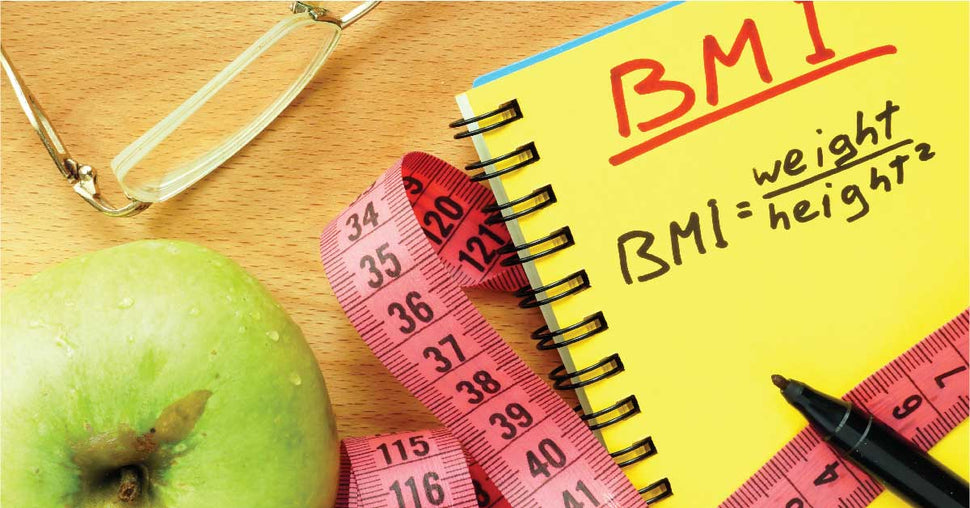How BMI and BMR Play A Role In Your Weight Loss
19 Feb 2021
The terms BMI and BMR are frequently batted around in the fitness and health and wellness community, but they can be rather confusing. Aside from the fact that they sound similar, most people don’t really know what they mean. If you have just taken up a diet or exercise program to lose weight or build muscle mass, it would help to understand both terms. Knowing your BMI and BMR will help you to create a fitness and diet plan that is more suitable for your body and lifestyle. So, to understand the difference between BMI and BMR, let’s first understand what each term means.
What is BMR?
The term BMR stands for basal metabolic rate, which is a term that refers to your body’s caloric requirements for the sustenance of the most basic functions. These are known as basal functions and include respiration, circulation, cell production, and so on. Knowing your BMR helps with weight management as it tells you how many calories your body actually burns per day. While BMR can be measured most accurately in a lab, you can also use the Harris-Benedict Equation, which is regarded as fairly reliable for the purpose (1).
For Men:
BMR = 88.362 + (13.397 x weight in kg) + (4.799 x height in cm) – (5.677 x age in years)
For Women:
BMR = 447.593 + (9.247 x weight in kg) + (3.098 x height in cm) – (4.330 x age in years)
You can now use this BMR number to calculate your daily caloric requirement based on lifestyle.
- If you lead a sedentary lifestyle with little to no activity it’s BMR x 1.2
- If you engage in mild or light exercise few days a week it’s BMR x 1.375
- If you are moderately active and exercise at least 3-5 days a week it’s BMR x 1.55
- If you exercise rigorously at least 6-7 days a week it’s BMR x 1.725
The number you get is roughly the amount of calories you need per day to maintain your current weight. To lose weight, you would need to reduce your calorie intake so that you’re burning more calories than you consume.

What is BMI?
When it comes to BMI vs BMR, the one thing that BMI has going is that it’s better known to most people! BMI or body mass index is the most commonly used measure of a person’s body weight in terms of assessing their status as at a healthy weight, overweight, or obese. The calculation takes into account weight and height, but it doesn’t actually measure body fat or consider age, gender, or muscle mass. This is why it is not completely accurate, but it can help to provide rough estimates of health risks whether your BMI is low or high.
To calculate BMI you simply have to divide your weight in kilos by your height in meters squared. In other words BMI = kg/m2
You can then use that number to assess your health status and risks from the context of bodyweight. Here’s what those BMI numbers mean (2):
- A measure of under 18.5 is considered underweight.
- A measure of 18.5 to 24.9 is considered healthy.
- A measure of 25 to 29.9 is considered overweight.
- A measure of 30 to 39.9 is considered obese.
BMI vs BMR
Now that you know the BMI BMR basics and can calculate both measurements yourself, it’s time to understand the difference between BMR and BMI if this isn’t already clear enough. Understanding the difference between BMI and BMR will help you to use both measures to plan a more effective and sustainable plan for healthy weight loss.
The key differences between BMI vs BMR include:
- BMI is a statistical calculation or measurement which means that it is standardized, while BMR has variance since it is calculated with variables such as weight, height, age, and gender. The key difference is therefore that BMI gives you a vague assessment of body weight, fitting you into broad categories, whereas BMR provides more personalized measurements.
- BMI measurements only give you a broad range and an estimate of weight status. On the other hand, BMR takes into account the energy requirements for basal or essential body functions, including respiration, circulation, digestion, cell production, and so on. It informs you about your daily caloric requirements, not about your weight.
- BMI calculations tend to be less accurate than BMR as BMI does not take into account gender differences, ignoring the fact that women have more muscle fat. It also doesn’t consider age and older adults might show normal BMI despite having excess body fat. When it comes to BMR on the other hand, the calculation for caloric requirements is more accurate as it not only considers gender, but also takes into account age.
How To Use This Knowledge of BMI and BMR
Now that you know the BMI and BMR differences and how both calculations work, it’s time to put them to use in your efforts to lose weight. You can use BMI to gauge your body weight status to determine how much excess weight you have and how much weight you need to lose. At the same time, you should keep in mind the first difference between BMR and BMI that we pointed out. As BMI is standardized and fits you into broad categories it is not completely accurate. It should simply be used as a rough guide. Once you have determined your BMI and decided roughly how much weight loss you’d like to achieve, you should then calculate your BMR. Using the BMR calculation you can determine your required caloric intake per day. To lose weight, your caloric intake needs to be lower than this figure, so that there is a deficit and your body is forced to turn to fat as an energy source. At the same time, make sure that you do not reduce your calorie intake significantly lower than the daily required amount as this can lead to other health risks.
When attempting to lose weight, whether you’re using BMI and BMR calculations or not, it’s easy to develop nutritional deficiencies, so keep a track of your dietary nutrient intake and consider taking the necessary supplements to ensure healthy weight loss. To boost your weight loss efforts, you can also try using SETU’s Garcinia supplement, as the herb is known to boost metabolism and aid appetite regulation, making it easier to stick to a healthy diet and weight loss program (3).
Recommended Reads:
https://www.setu.in/blogs/lifestyle/sleep-an-easy-way-to-manage-weight/
https://www.setu.in/blogs/lifestyle/how-to-lose-belly-fat/
https://www.setu.in/blogs/lifestyle/apple-cider-vinegar-for-weight-loss/
https://www.setu.in/blogs/food/meet-the-scientifically-proven-weight-loss-genie/
Skin: Renew - Glutathione - Orange Flavour
- ₹1,994
- ₹1,994
-
₹2,600 - ( 23% OFF)
Categories
- Choosing a selection results in a full page refresh.
- Press the space key then arrow keys to make a selection.
this is the sidecart









